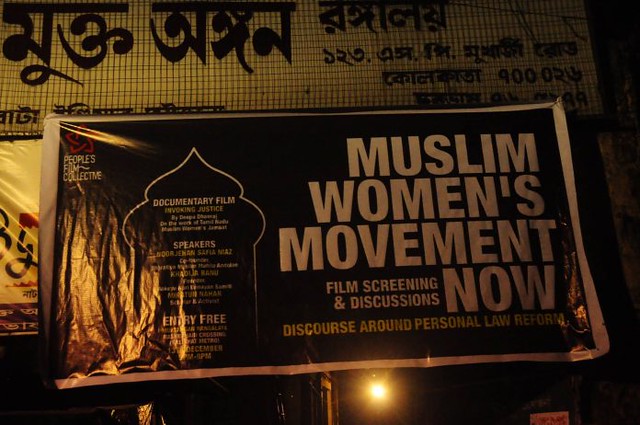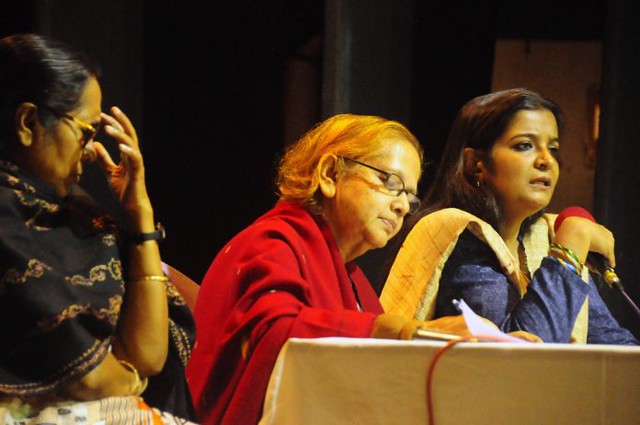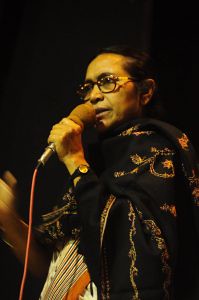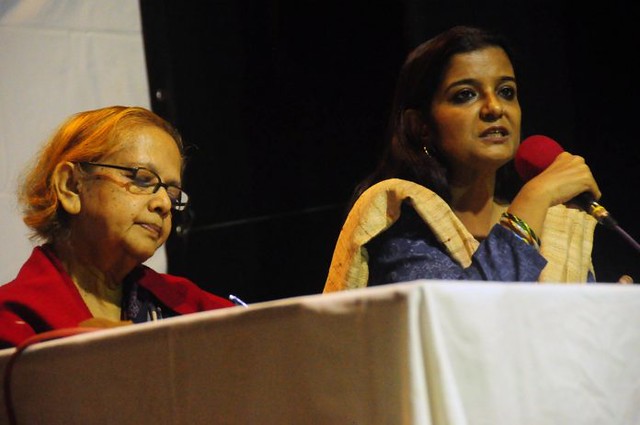By Afreen Firdaus Idrees for Twocircles.net

The All India Personal Law Board (AIMPLB) has monopolized the ideological debate on the issue of the rights of Muslim women in India, with Muslim women seldom consulted in matters about their lives. If anything, the event Muslim Women’s Movement Now: Discourse around Personal Law Reform, organized by People’s Film COllective at Muktangan Rangalaya on December 13 was an earnest attempt to create such a pocket of freedom, as it were, a democratic space for Muslim women to do the talking, and for us to listen to what they had to say. It was a zanani mehfil in that all the speakers were women, and Muslim. These were luminaries in their field of work: Noorjehan Safia Niaz, who is co-founder of Bharatiya Muslim Mahila Andolan; Khadija Banu who is the founder of Rokeya Nari Unnayan Samiti; and Miratun Nahar, scholar and activist, who was the chairperson for the session.
With reference to the Muslim personal law, spheres that both Khadija Banu and Noorjehan Safia Niaz have endeavoured relentlessly to reform, in the capacity of their respective organisations, includes abolishing the practice of unilateral, extrajudicial divorce or triple talaaq, banning or regulating the practice of halala marriage, and polygamy, establishing a minimum age for marriage, and guaranteeing women’s right to inheritance, divorce, and maintenance. India’s largest religious minority–the Muslim community–remains hemmed in between two legal models that foster little account of justice and emancipation. The speakers focussed on Muslim women specifically, who are confronted by the encumbrance of what can be seen as a double-bind: the parallel discrimination and vulnerability by two juridical frameworks. One of these is the formal, secular, constitutional law of the land. The other is the theologically authorised mechanism ordained at the local level. More often than not the secular and the sacred are contingent on one another to supplement and thereby reinforce gender categories. Muslim women encounter this markedly in the context of the triple talaaq.

Not long ago, 35-year-old Shayara Bano, who was divorced in absentia through the medium of a letter, had petitioned the Indian Supreme Court to pronounce the arbitrary triple talaaq practice illegal, as she claimed that it violates her right to life, personal liberty, equality before the law and prohibition against discrimination – fundamental rights set down in the Indian constitution. The Muslim Law of divorce, as it is construed and put into effect in India, lopsidedly favours the man. For the divorce law to be non-discriminatory towards women, the unjust and traumatic constructs of oral talaaq, unilateral talaaq, and triple talaaq in one sitting, must go.
Both Khadija Banu and Noorjehan Safia Niaz elucidated manifold facets of divorce keeping in mind the Qur’an and the Hadith. Both staunchly discredited the tradition of triple talaaq contending that it is against the precepts of the Qur’an and the Sunnah of the Prophet, and clearly a cultural phenomenon. The ground reality is that women are being divorced for the most banal reasons, stripped of their social status and respect, and deprived of their basic rights. None of the Qur’anic guidelines of discussion, arbitration, witnesses, stipulated waiting period (idda) or even an honest effort to resolve differences are being observed. In such circumstances, the concerns of alimony or the rights of children are relegated as non-issues. Drawing upon miscellaneous case studies documented by them apropos women and divorce, Khadija Banu furnished statistics and analysis of the implications and impact of divorce on women in Murshidabad, a predominantly Muslim region in West Bengal. She spoke of the rising incidence of triple talaaq and the ensuing pauperization of a burgeoning number of women and children among Muslims. Khadija Banu described how categories of divorce admissible under the Muslim Personal Law and prevalent in society, was antithetical to the spirit of the Qur’anic injunctions, and that this has licensed an apathetic, casual attitude towards women. She advocated for change in the Muslim Personal Laws pertaining to divorce in India to protect women – explicitly those in disadvantageous economic situations – from exploitation in marriage. The existence of such laws makes wives singularly defenceless, and anxious vis-à-vis their marital status.

Noorjehan of BMMA underscored how the procedure of triple talaaq has been made illegal in 22 Muslim majority nations, but continues to be authorized in India under the aegis of the Muslim Personal Law (Shariat) Application Act of 1937, which proclaims that matters relating to the Muslim community’s personal disputes, the state will not interfere and a religious body will instead pass judgments. As Noorjehan pointed out, the Shariat Application Act of 1937 does not unambiguously delineate the contents of these laws. She went on to say that even in present day, post-independence India, Muslim personal law – apart from a few half-baked attempts – has not been codified, and its existent ambiguities are open to the exegesis of the religious authorities. One reason for this has been the unwillingness of consecutive governments that have come to power to act intrusive or embroil itself in issues of the community’s personal law, and take a chance with alienating the Muslim leadership, whose allegiance and electoral support they want to ensure. Thus, the governments in attempts to placate Muslim religious leaders have pandered to their sensitivities, bestowing concessions as the Congress government did in the controversial Shah Bano Case (in the form of introducing a regressive legislation – Muslim Women [Protection of Rights on Divorce] Bill – which exonerated the husband from paying maintenance), looked the other way in cases of legal discrimination faced by Muslim women, and have also overlooked alternative, dissenting, progressive voices within the Muslim community. The successive governments in power have thus un-problematically assumed that the Muslim community is exclusively a religious community, that the Muslim Personal Law Board (whose members aren’t even elected) and Ulemas are its sole representatives, and that there exists a consensus within the community about the Muslim personal laws themselves – a payoff damaging to women and to questions of gender justice, by definition.
Noorjehan Safia Niaz unequivocally disparaged the tradition of halala as it exists in our society, which she posits as an innovation and its warped understanding, in essence, as being un-Qur’anic. The botched perception of halala is that the former husband, on realizing his error in divorcing his wife on a whim, expediently plays impresario to facilitate a marriage of his former wife to another person expressly contracted for this scheme, impels the newly-weds to consummate this marriage, and then also pre-arranges a swift divorce in order to maneuver legitimacy for his remarriage with her. The divorced woman’s humiliation and agony is, thus, complete. Noorjehan mentioned that there are reported incidents of Qazis volunteering themselves for this short-lived, instrumental second marriage. The notion of halala, Noorjehan claimed, was being distorted, and second marriage (meant to be an optional and voluntary prerogative for a divorced woman) being made requisite by the interpreters of Shariat, thereby institutionalizing atrocity over divorced women and robbing her of the agency granted to her by the Qur’an. The twisted cognizance of halala could also be seen as a corollary added by the very apologists of the farcical triple talaaq as recompense sans accountability for the man.

In a political climate of deep-rooted anti-Muslim prejudice, intermittent Islamophobic violence, and thriving Hindu aggression, one of the overriding, logical suspicions of the Muslim community en masse about the calling for a ban on the triple talaaq entails that the discourse of gender equality, and the discourse of the ‘protection’ of Muslim women are a smokescreen for the expansion of the dominance of a Hindu-majority state into the realm of minority group autonomy.
Also, it seems imperative to italicize that, any opposition to or questioning of Muslim community’s gender-biased practices which have the blessings of its religious leadership – the vanguards of the identity group – is rendered to be a threat to the group’s jurisdiction and validity in the political macrocosm.
From the Muslim woman’s point of view, the dilemma resides in the monophonic insistence on the unity and homogeneity of community identity by its Ulemas, defined and confined in the grammar of family codes enshrined in the religious personal law, which resul

